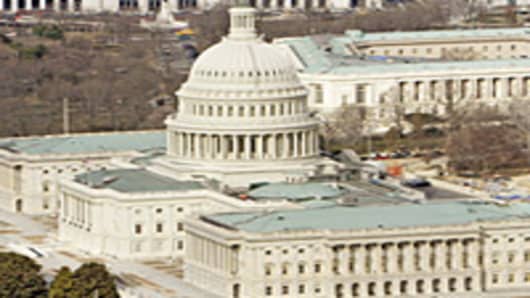Democrats in Congress are gearing up to pass a second election-year economic stimulus package, but unlike the $152 billion measure that passed in February, they are not counting on getting the support of President Bush.
Leaders in the House and Senate are discussing with key committee chairmen the shape of another emergency spending bill that would again aim to spur the economy and help those hurt by the economic slowdown, several congressional aides said Tuesday.
That comes on the heels of this week's enactment of increased jobless benefits, another Democratic priority.
Infrastructure projects—road and bridge building and other government-funded construction—top the list, according to those aides. At least $8 billion in funds could be sought just for these projects, although aides said there were no firm cost estimates yet for any portion of the legislation.
If such legislation advances and it follows the formula of emergency measures enacted this year, the new stimulus would add to already steep deficits that worry fiscal conservatives.
Last week, Senate Majority Leader Harry Reid, a Nevada Democrat, told reporters, "I think that we're going to come back at a later time and do other things that are extremely important." He singled out the need for more money for disaster relief, law enforcement and a program that helps low-income families pay their heating and cooling bills.
Reid's spokesman, Jim Manley, said Reid and House Speaker Nancy Pelosi of California have held several conversations on possible legislation.
"July might be a little quick to pull it off. September seems more likely" following a month-long August recess, said one House aide, who asked not to be identified.
Last January and February, the White House and congressional Republicans displayed rare bipartisanship when they worked to enact a $152 billion plan, mostly tax rebates, to stimulate the economy by trying to boost consumer spending.
In crafting that package, Democrats gave up, at least temporarily, on a series of initiatives they wanted, from more food stamps for the poor to expanded unemployment benefits and government-funded construction projects.
Bush opposed those add-ons, citing cost concerns.
Since then, the national unemployment rate has risen significantly, oil prices have continued to climb steeply amid rising home foreclosures and overall consumer worries in this election year have deepened.
On Monday, Bush signed a $162 billion war funding bill that Democrats successfully coupled with more jobless benefits for the long-term unemployed and a significant expansion of education assistance for U.S. combat veterans.
Now, with the campaign season getting into full swing and with Democrats hoping to expand their majorities in Congress and capture the White House, they are eager to tout yet another round of economic stimulus, even if it faces a Bush veto, the lawmakers' aides said.
Economist Lawrence Summers, who has been mentioned as a possible Treasury secretary if Democratic Sen. Barack Obama is elected president, wrote in a Financial Times column this week that "there is now ... a case for carefully designed support for infrastructure investment."
Another economist, liberal Robert Reich, who, like Summers, served in President Bill Clinton's administration, is calling for a one-year exemption of the first $15,000 of income from payroll taxes.


